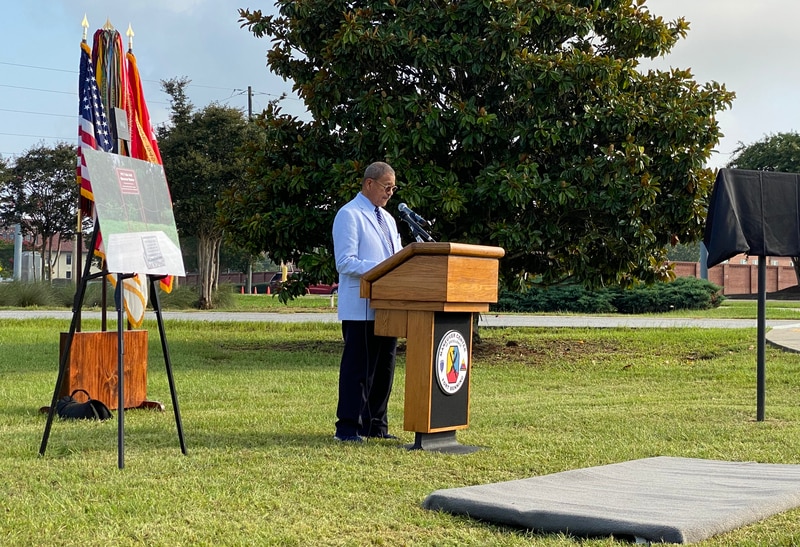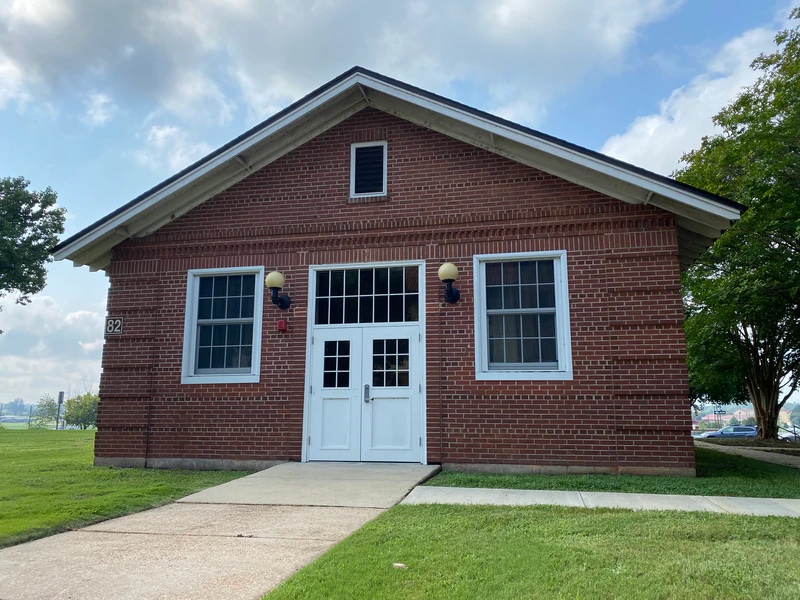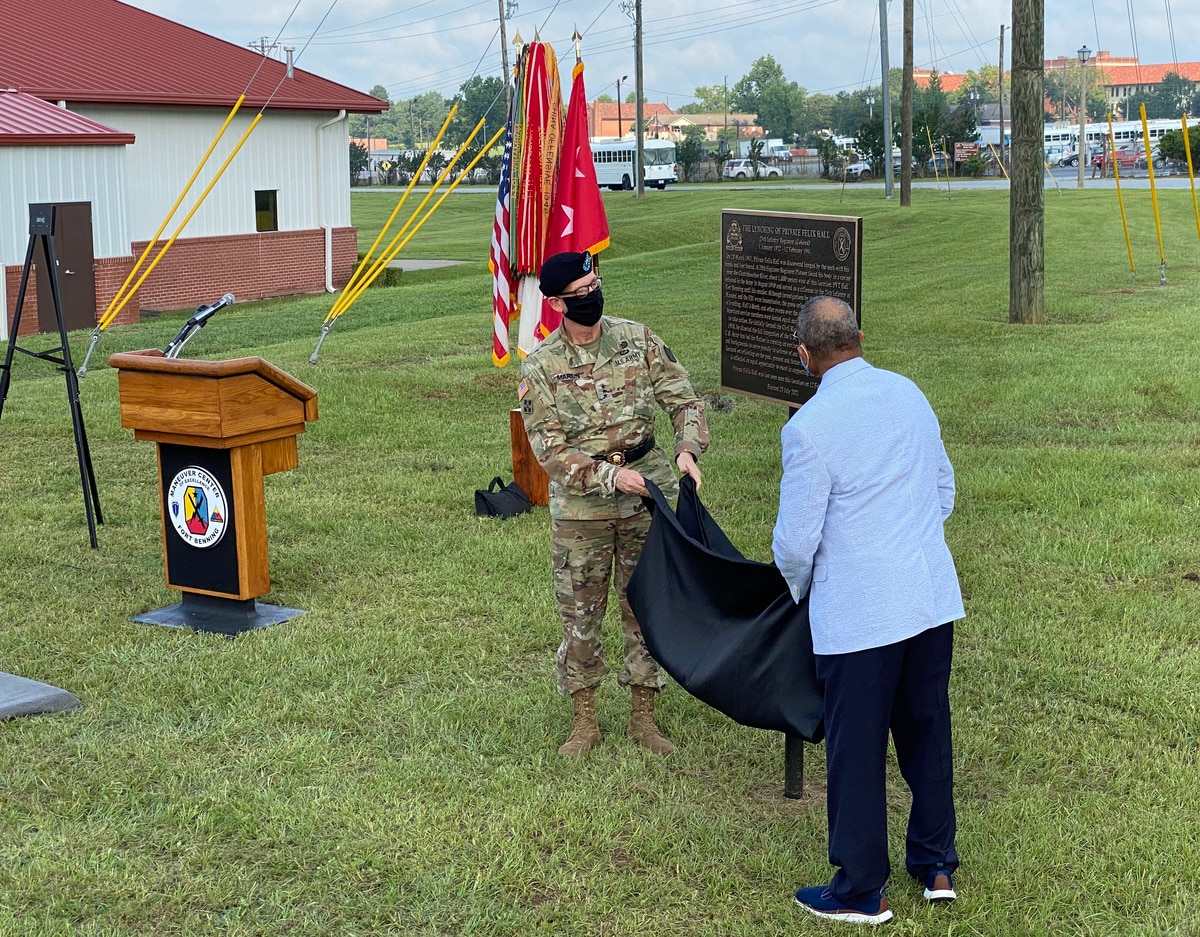FORT BENNING, Ga. — In the shadow of the installation’s iconic parachute towers, Fort Benning and Army officials joined local lawmakers for a small ceremony Tuesday dedicating a memorial plaque in the approximate place where Pvt. Felix Hall was last seen alive.
Hall, a 19-year-old Black man from rural Alabama, joined the segregated 24th Infantry Regiment in August 1940 as the nation prepared for World War II.
It was after a shift at the installation’s sawmill on a Wednesday afternoon — Feb. 12, 1941 — when Hall said goodbye to two friends from the 24th Infantry Regiment and started towards the post exchange.
He never made it.
Six weeks later, an engineer unit found his body in a ravine near the Chattahoochee River, with hands tied behind his back, feet bound with baling wire and a noose around his neck.
Another plaque will soon mark the place where Army officials believe his body was found.
The Post’s investigation faulted the FBI and War Department for an apparent failure to take the investigation seriously.
The FBI identified suspects but seemingly ignored potentially critical evidence and leads, including a report that the day before Hall disappeared, his civilian supervisor at the sawmill had threatened to kill him if he came back to work there.
Army officials at the time tried to tell the public that Hall’s death had been a suicide.
All of this weighed heavily on Rep. Sanford Bishop, D-Ga., whose office helped lead the push for a memorial to Hall. Bishop’s district includes Fort Benning and most of the neighboring city of Columbus.

In remarks delivered at the ceremony, Bishop reflected on the “dual purpose” of lynchings like that of Hall.
“They were meant to kill the victim and frighten the [Black] community,” said Bishop, noting that Hall “was neither the first nor last African-American service member whose murder was racially motivated.”
Lynch mobs in the Jim Crow South frequently targeted Black servicemembers and veterans because they represented a threat to the region’s white supremacist hierarchy, according to a 2017 report from the Equal Justice Initiative.
“I wish today felt like we were righting a wrong,” said Lt. Gen. Theodore Martin, commander of the Army’s Combined Arms Command, in his speech. “I know what we’re really doing is just acknowledging one.”
Bishop agreed, characterizing the Army’s efforts as an “acknowledgement” rather than an apology.
“In the months following [Hall’s] death, a deceitful and disgusting effort was made to suggest that Pvt. Hall had taken his own life,” Bishop said. “There was no honorable burial, no communal acknowledgement of the wrong he suffered, no closure, no arrest, no trial.”
Both Bishop and Martin commended the progress the Pentagon has made in addressing historical wrongs and inequities. The ceremony occurred amid the churn of ongoing efforts to rename Army installations that were originally named in honor of Confederate officers.

Fort Benning is one such post — its Confederate namesake, Henry Benning, was an ardent white supremacist and secessionist. Benning’s daughter was head of the local United Daughters of the Confederacy chapter that suggested the installation’s name when it was first built during World War I.
A DoD commission is currently gathering community feedback on new names and determining the extent of Confederate memorialization and names on Army installations in particular. The commission will submit an in-progress report to Congress in October.
Bishop told Army Times after the ceremony that he recently met with retired Navy Adm. Michelle Howard, the commission’s chair, during a visit with the local community. The commission’s community meetings are closed to the media.
“I’m very, very inspired by what they’re doing and the meticulous way that they’re going about developing these changes,” the congressman said. “It just underscores the fact that we still have a lot of work to do.”
The new memorial is also located along the installation’s historic walking and biking trail, which seeks to highlight aspects of the installation’s heritage for visitors and soldiers alike.
“It is 80 years overdue for Pvt. Felix Hall,” said Bishop.
[hr]
Originally published by Military Times, our sister publication.








